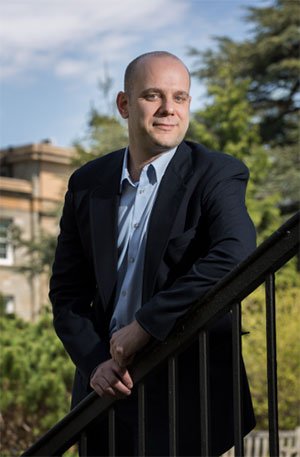Classicist Jeremy Lefkowitz Receives Rome Prize

While in Rome, Lefkowitz will work on two books as part of his project, “Aesop's Pen: Writing and Collecting Fables in Antiquity.”
The chance to spend a year in Rome and breaking bread and sharing perspectives with scholars and artists from around the world may sound like a dream. But for Jeremy Lefkowitz, it’s reality.
As a recipient of a Rome Prize Fellowship, the assistant professor of classics will head to Rome in September to pursue a project in ancient studies. He joins 30 other fellows — including Lauren Jacobi ’98 and Mali Skotheim ’05 — on an adventure of the mind.
“Everything I’ve learned about the Academy makes it sound like an intellectual fantasy world,” says Lefkowitz, citing the American Academy in Rome’s buildings and gardens along with its emphasis on connecting fellows to the people and places of Italy. “To spend a year at the Academy with so many brilliant and talented people — it’s almost too good to be true.”
Each year, the Rome Prize is awarded to about 30 emerging artists and scholars who represent the highest standard of excellence and who are in the early or middle stages of their working lives. This year, more than 900 arts and humanities scholars from around the United States applied. In the second stage of the process, Lefkowitz traveled to New York City to make his case to four ancient studies scholars. A few days later, he received the call of congratulations.
Hearing that he won triggered “a strange combination of being totally shocked and yet feeling like this was a thing that had to happen, because I’ve been desperate to get to Rome for a long time,” he says.
“I immediately started imagining what it will actually be like,” he adds. “All the work I’ll get done, the things I’ll get to see … and the things I’ll get to eat!”
Lefkowitz will work on two books as part of his project, “Aesop's Pen: Writing and Collecting Fables in Antiquity.” The first is an extensive commentary and translation of Aesopic fables as they have come down to us from a wide array of Greek and Latin sources, he says, the second a slimmer monograph that will explore what it meant to be a fable author in antiquity.
Side excursions and events throughout Rome will also give Lefkowitz a strong sense of the city’s topography and physical remains, which he will incorporate into classes at Swarthmore, he says.
“Engaging with the city and being exposed to new perspectives and ideas could change pretty much everything I teach about antiquity,” he says. “I’ll return as a different person.”
Belonging to a vibrant community of scholars and artists also presents opportunities for collaborations back home.
“I’ll be eager to bring some of the people I meet to Swarthmore,” says Lefkowitz. “I’m hoping for this to impact not just me but the department, and even the College as a whole.”
Lefkowitz will interact with at least two other Swatties in Rome. Skotheim, who is a Ph.D. candidate at Princeton, also won a fellowship in the ancient studies category. Jacobi, an assistant professor of architecture at MIT, won in Renaissance and early modern studies.
It was another Swarthmore connection that raised Lefkowitz’s long-time interest in the Rome Prize. The late Centennial Professor Emerita of Classics Helen North was an Academy fellow, board member, and trustee.
“My own thinking about ways I could go abroad and connect with the international community stem from my deep respect for Helen and all of the remarkable things that she accomplished,” he says.



